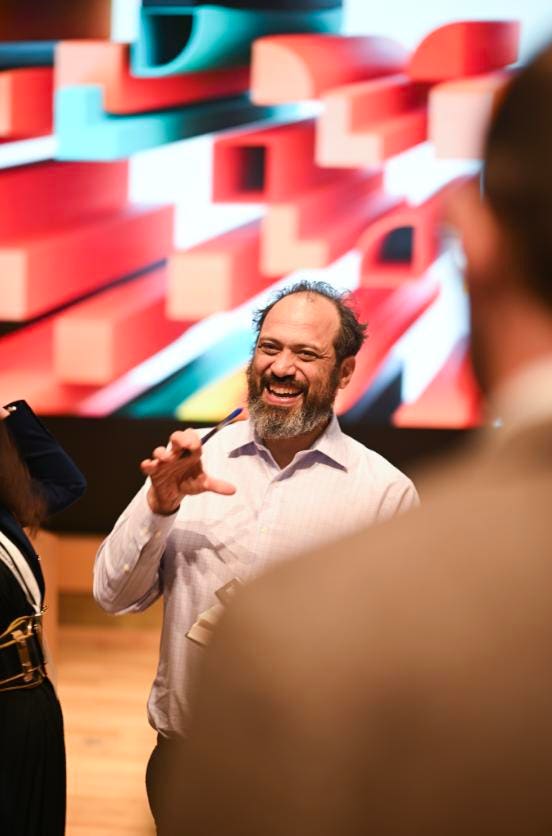Ethan Mollick
It seems like only months, not years ago, that we encountered ChatGPT and related models and realized that AI could string sentences together.
But now, brand new models are moving deeper into the physical world in ways that should make everyone sit up and take notice.
We had news, just within the last few weeks, that Anthropic’s AI Claude is able to use a computer interface in the same way as a human.
A man’s Turing test
To see in detail how this will shape the future, we can get some input from Ethan Mollick, the writer of “Co-intelligence” and “The Unicorn’s Shadow”, who is an accomplished scientist, PhD at MIT and professor at Wharton. .
Wharton School of Business at the University of Pennsylvania, Philadelphia, PA, USA (Photo by: … [+]
You can also read Mollick’s essays on his blog, Oneusefulthing, where he talks about many applications of modern AI, but in the AI Daily Brief on October 28, he presented some of his experience showing the power of what Claude can do. do.
“The new Claude computer usage model announced today gives us a hint of what an agent means,” says Mollick. “It is capable of some planning. He has the ability to use a computer by looking at a screen, taking a screenshot and interacting with it, moving a virtual mouse and typing. It’s a good preview of an important part of what agents can do.”
The concept of human and robot work. Woman competes with artificial intelligence. Automation of … [+]
It’s a new paradigm, he notes, with many ramifications for how we’ll develop our interactions with robots.
“Normally, when you interact with an AI, it’s like having a conversation,” he says. “With this agent approach, it’s about giving instructions and letting the AI do the work.”
Mollick notes that unlike traditional systems, using the newly adapted Claude is more like delegating and using a manual method to get results from the AI entity itself. He continues the process of asking Claude to design a lesson plan based on Fitzgerald’s The Great Gatsby, aligned with the Common Core Learning Standards.
“I’m presented with drafts to comment on, not a process to manage,” he says. “I just delegated a complex task and walked away from my computer, checking back later to see what it did. Because AI is a smart, general-purpose system. It can handle many tasks. It doesn’t need to be programmed to to do them.”
Can you get away from AI?
This is interesting in part because that part of the departure is important. It demonstrates the computer’s new ability to work on its own. If you think about a conversation and the limitations of that interface, when you start, you know you’re going to be sitting at a desk the whole time, texting back and forth. Even modern conversational AI needs constant prompting. Claude doesn’t.
Mollick talks about training the model on a game called Paperclip Clicker, and demonstrates how the system made mistakes but followed the actual strategy and was able to correct based on its reasoning skills.
Everyone makes mistakes, even AI. It is that part of the strategy that is new and exciting. Mollick describes how the system even performed A/B testing, one of the most useful benchmarking processes for marketers, even though it made mistakes. At the end of the day, he said, AI made 100 independent moves without asking a single question.
His performance, he says, improved after giving AI this prompt:
“You are a computer,” he said. “Use your skills.”
According to Mollick, Claude then realized he could write code to automate the game. While this ended up being an inferior approach, and Claude went back to doing things “the old fashioned way”, the ability to choose is in itself amazing, something we wouldn’t have seen even ten years ago.
On the other hand, HE is not like god. At least not yet.
“LLMs can end up chasing their tails or being stubborn,” says Mollick, discussing the mistakes he saw Claude make. However, he adds, the system is certainly autonomous, which represents a departure from the linear programming of the twentieth century.
“She wants to be left alone to go and do the work,” he says of his testing. “I was surprised at how capable and flexible the system already is.”
Are the Top Brass ready?
Following Mollick’s essay, here are some of the AI Daily Brief podcast host’s remarks on the challenges for business today:
It’s all about that quick turnaround that is often so difficult for companies to adapt to.
“(Business leaders) haven’t gotten their heads around the assistant paradigm yet, and yet here we are with this new agency paradigm going downhill,” he notes. “They will not only need to build new skills, but (also) fundamentally new ways of thinking about working and structuring their organizations. And I think what’s helpful about this blog post and the testimony it represents is that it’s clear that it has to start with a mindset shift. There is a mindset shift involved in AI in general, and the assistant or chatbot paradigm, and there is another mindset shift required for agentic use. This will be the difference in corporate transformation for the next 10 years, and the sooner they start, the better off they will be.”
In this exciting overview of the new capabilities of agentic AI, one thing shines through – we will need to work as fast as innovators and engineers, as fast as models are naturally evolving, to be able to adapt to a new world where we are no longer the smartest in the room.

